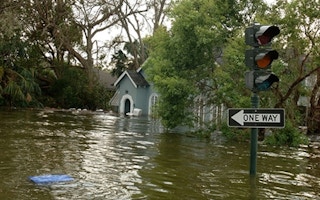Adapting to inevitable global warming will need changes across the Australian economy, including ditching property taxes that discourage people from moving out of areas prone to extreme weather events, the government’s independent research arm says.
In a draft report released overnight, the Productivity Commission also calls for a close examination of federal disaster relief, which in a changing climate could create ”moral hazard”, giving people less incentive to insure themselves and allowing state governments to neglect infrastructure.
Accepting that some degree of climate change is now inevitable, the commission says Australia will need to adapt.
This means removing obstacles in the areas of taxation, local government, disaster relief, planning and building rules and emergency management, according to the report.
Conveyancing duty, which makes it expensive to move house and creates a ”lock-in effect”, should be ditched in favour of more broad-based land taxes, the report says.
”Home owners who desire to move out of areas at greater risk from extreme weather events may be discouraged from doing so due to conveyancing duty,” it says. The lock-in effect could also inhibit people from changing jobs and business locations, which ”could constitute a barrier to effective climate change adaptation”.
While forecasting that Australia is generally well placed to adapt to global warming, the commission has some tough love for farmers in particular, saying marginal agriculture will need to be wound up. Land tax exemptions on agricultural land could encourage farmers to keep working on marginal land even as it becomes unworkable because of climate change.
Scrapping these exemptions could ”remove a potential impediment to structural change in the agricultural sector” - giving farmers a stronger incentive to get out. The report adds: ”In its current form, government support during drought reduces incentives for agricultural businesses to be self-reliant and impedes economic and social adjustment to changing circumstances.”
Some local governments have already started managing climate risk, such as Redland City Council in Queensland, which has a strategy for ”planned retreat” in extreme events.
But the commission’s report says local councils’ rights and responsibilities in coping with climate change need to be clarified by state governments. Some councils, for example, are reluctant to release information on climate change for fear of driving down property prices, exposing them to legal action.
The commission also calls on the Council of Australian Governments to develop a national approach to deciding ”how or when governments should ‘protect’ cities or towns or relocate communities from high-hazard risk areas”.
Controversially, the report calls for an independent review of the Natural Disaster Relief and Recovery Arrangements, to see whether these discourage state and territory governments from investing in infrastructure.
”Care must be taken to avoid measures that diminish the incentive to manage risk,” it states. State and territory taxes on general insurance also stand as a barrier to climate change adaptation, the report says.










